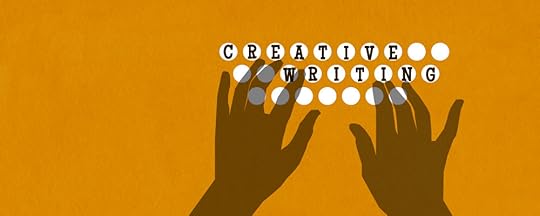L.R. Lam's Blog, page 22
June 30, 2015
Windows and Doors to Our Worlds: Writing LGBTQIA Literature
A post I wrote for Author Allsorts:
 Originally posted on AUTHOR ALLSORTS:
Originally posted on AUTHOR ALLSORTS:
 Photo credit: Joseph D. Lipka
Photo credit: Joseph D. Lipka
This past weekend I was at the American Library Association (ALA) conference in San Francisco. I’ve always wanted to go—I love libraries. I grew up in them, and I worked at one as an assistant for about 8 months, contemplated becoming a school librarian, and was essentially a corporate librarian for 3.5 years. The fact that it was over Pride weekend was extra awesome, as it meant I could also experience one of the biggest LGBTQIA celebrations ever right after the SCOTUS win for marriage equality (Jim Obergefell’s happy, tear-streaked face was my best memory. Such joy, gratitude, lingering grief, and pride).
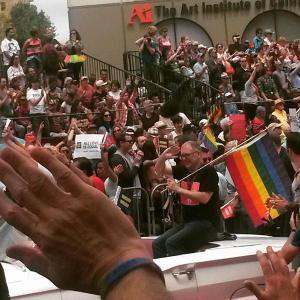 My photo. Loads more photos of SF Pride on my Instagram.
My photo. Loads more photos of SF Pride on my Instagram.
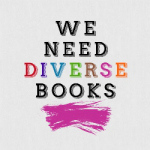 A very welcome overarching trend that weekend was diversity. The #WeNeedDiverseBooks group was there in force, and I saw a great panel—probably one of the best I’ve ever seen—yesterday with Marie…
A very welcome overarching trend that weekend was diversity. The #WeNeedDiverseBooks group was there in force, and I saw a great panel—probably one of the best I’ve ever seen—yesterday with Marie…
View original 1,073 more words


June 23, 2015
The Road Trip to Los Angeles
Last week, my family and I took a road trip down from the SF Bay Area to Los Angeles. We haven’t done a road trip with just me, my mom, and my brother for a good ten years, and it was great. On the way down, we stopped at Marina State Beach (near Monterey).The next stop was at Pismo Beach, which was lovely, and we spent the night in Santa Barbara. The next day, we explored Santa Barbara, going to the marine center and the Presidio, before we battled traffic to Los Angeles.

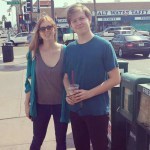



In LA, we stayed with my Aunt Debby, Uncle Kurt, and my cousin Jake. My aunt has changed careers lately and become an interior designer, and you can see her work here. They have a beautiful home right by LAX, so at night I heard the planes flying overhead.
 The pretty lobby of CAA
The pretty lobby of CAAWe had a busy time when we were down south. On the Friday, me, my mom, and my aunt had a girl’s morning and had manicures and pedicures. Then we all met up for sushi. After that, my brother had to play chauffeur and bring me to a meeting with one of my film agents, Jon Cassir. It was really surreal sitting in the lobby of Creative Artists Agency, realizing I was represented by the same company that reps so many film stars. It was one of those moments where at the low point at the start of 2014 where I thought my career was over and you told me in 1.5 years I’d be sitting there, I wouldn’t have believed you. It was a great meeting where I learned more about how film options and development works, as I wasn’t entirely sure before.
After that, my brother and I went down to Long Beach to meet my older half-sister Wendy, who lives in Anaheim. My dad had two kids as a teenager and two kids in his forties, so my older sister is 52. We had a nice meal at a diner then came back, getting lost about 50x in the process.


Saturday was devoted to book research. My option book for my Tor contract is set in LA, so it was incredibly useful to be able to crawl around downtown and see some buildings I’d googled while drafting the first half of the book. It was sad to see how certain parts of downtown, like the area around the Bradbury building, had once been so lovely but now looked a bit tired and run down, with most of the grand theatres shut or turned into random shops.

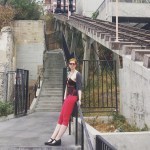



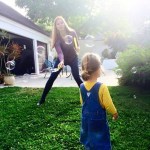
Saturday night was my aunt’s birthday, where I was able to see my cousin Dylan and his wife, Rixt, and their adorable daughter Ava for the first time since they moved away from Amsterdam in 2013. Rixt’s parents were also out, and last time I was in Amsterdam we went to their very adorable home outside the city.
Sunday, my childhood friend Natalie drove up from Orange County with her also adorable daughter, Isis. We wandered around Hollywood, which was a trip. So loud and crowded and so many different people smooshed together. People dressed up in costumes or street performers trying to make a buck. People hawking tours around the star’s homes. Religious people in conservative clothing trying to save all the sinners. Little kids amazed at the princesses. Gawping tourists, locals just trying to get from one side of Hollywood to the other.



Monday was Disneyland. We left the house early and was actually through parking and the lines and into the park by 9 am. We left the park at around half ten at night. We went on 18 rides, walked almost 11 miles, and got to have dinner at the Blue Bayou, aka the restaurant inside the Pirates of the Caribbean ride.


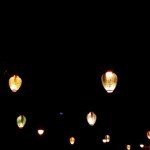

Tuesday it was time to head back up north. We said farewell to our family and hit the road. I was feeling so drained from Disneyland (near the end of the night I’d half-lost my voice), so I slept in the car. We took a hike at Point Lobos and saw seals!




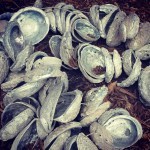
That night we spent in Carmel, which was very cute and quaint but would be crazy expensive to live there. We had some amazing Mediterranean food.
The last day of the road trip, we explored Carmel a little more, spent some time on the beach, and went to the nearby mission. By then, we were nearly home, and it felt good to be back and knowing Craig, my husband, would be flying out the next day.



Now I’m still hanging out with family a lot, but trying to get back into work, doing such joyous tasks as my UK and US taxes. I’ve finished a short story and will soon tackle my half-finished book, which should be easier now that I’ve visited the setting. It’s been nice to be back :-)


June 4, 2015
Books Read in May
Didn’t read as much as I’d like due to editing deadlines, but I still went through a couple.
1. Only Ever Yours – Louise O’Niell. A dystopian future similar to The Handmaid’s Tale. I can see why it’s gotten so much attention, but it didn’t quite work for me. I’d try another book of hers, though.
2. The Mirrored World – Debra Dean. Historical fiction set in Russia around Catherine the Great’s time. I enjoyed it but certain aspects felt glossed over.
3. The Shining Girls – Lauren Beukes. Been meaning to read this for ages after really enjoying Broken Monsters. It was a creepy, enjoyable thriller starring a time travelling serial killer.
4. Fool’s Assassin – Robin Hobb. Re-read in anticipation of Fool’s Quest being out this summer. I want to read the sequel so badly it pains me.
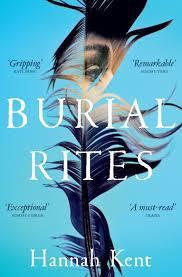 5. Burial Rites – Hannah Kent. A story of a woman sentenced to death for murder in Victorian Iceland. Well-researched and written, and unsurprisingly, a sad read.
5. Burial Rites – Hannah Kent. A story of a woman sentenced to death for murder in Victorian Iceland. Well-researched and written, and unsurprisingly, a sad read.
6. The Innovators: How a Group of Hackers, Geniuses and Geeks Created the Digital Revolution – Walter Isaacson. Partly book research, partly general interest. A good overview.
Total books so far in 2015: 31.


May 14, 2015
The Definitive Future of the Micah Grey Series (PANTOMIME, SHADOWPLAY & MASQUERADE)
Micah Grey has had an interesting journey over the past few years. I first dreamt up Micah in 2007 and started a book with the character 10 years older in 2008. At the end of 2009, I was having trouble with it, so I decided to write a “short story” of Micah as a teen joining the circus. That expanded into novella length and then I finally admitted it was a novel. I submitted an early draft of it in March 2011 to Angry Robot’s Open Door month. In November of that year, I had a revision request because it definitely needed work, and I gutted and rearranged it and it found a publisher in Strange Chemistry, Angry Robot’s new YA imprint. PANTOMIME was released in February 2013, and the sequel, SHADOWPLAY, in 2014. Sadly, in June 2014, Strange Chemistry closed. I wasn’t sure initially what the next step for Micah was going to be. I knew I wanted to finish the story with the third volume, MASQUERADE. I set it aside for a bit and I wrote and sold FALSE HEARTS to Tor, which made my dreams come true. Self-publishing seemed the most likely option for the 3rd Micah book, so I researched it and even made a whole draft of a Kickstarter. I self-published the Vestigial Tales last summer to learn about the process. I knew I’d be able to do it, but the idea of publishing on my own was also anxiety-inducing.
Then I discovered self-publishing wasn’t my only option. When I received the rights back for the first two books, my agent pitched my existing publisher. To my absolute delight, Tor UK has bought all three books of the Micah Grey series!
When my agent told me the news, I cried really ugly tears. I sobbed, I hiccoughed. I was a total, happy mess. MASQUERADE (and Micah’s) fate has been up in the air since April 2013. It’s a long time not to be sure of things, and I love this series so much. I’m so glad I’m able to share it with you and that my books starring an intersex protagonist will have the support of a mainstream publisher.
At the moment, this is a UK-only deal, but hopefully other publishers will follow. :-)
It’s still a bit of a wait for MASQUERADE (a little over a year) but PANTOMIME & SHADOWPLAY will be back up soon.
Thank you to my agent, Juliet Mushens, for selling this series twice now! Thank you to everyone at Tor for supporting my fantasy as well as my sci fi. And, finally, thank you to my readers: I really appreciate your patience and enthusiasm for the series. You kept word of mouth alive. You helped give it this second chance. Thank you, everyone who read my books and told others about them, whether on social media, by leaving reviews, or just physically shoving the book into someone else’s hands. You’re all awesome.
Here is the link to the initial press release, which is also pasted below:
PAN MACMILLAN BUYS DARK CIRCUS SERIES BY LAURA LAM
Pan Macmillan is very happy to announce that it has acquired world rights in PANTOMIME, SHADOWPLAY and MASQUERADE by Laura Lam, from Juliet Mushens at The Agency Group.
These enthralling books are set within a circus in a world somewhat like our own – but where wonders and magic really exist. A young runaway seeks escape from a life of injustice and secrets, and the circus promises freedom. There, Micah will become who she was meant to be, yet the future also holds conflict and dangerous mysteries.
PANTOMIME and SHADOWPLAY were originally published by Osprey Publishing’s Strange Chemistry, before the imprint closed its doors in 2014. But MASQUERADE, the final book in the Micah Grey trilogy, will be published by Pan Macmillan for the first time. Unlike Lam’s upcoming near-future thriller FALSE HEARTS, this series is written for young adults and adults alike.
Laura Lam said: ‘When I found out that the Micah Grey series would be re-released and completed by Pan Macmillan, I was so relieved and absolutely ecstatic. It’s been an interesting journey for Micah, and I’m extremely honoured and grateful to have the support of everyone at Macmillan for both my fantasy and my near-future thrillers.’
Senior Commissioning editor Bella Pagan commented: ‘I absolutely adored Laura’s False Hearts and am so delighted we’ll also be publishing her captivating first series too. These books also show off Laura’s huge talent and I just can’t wait for a new army of readers to discover this for themselves.’
Pan Macmillan plans to release PANTOMIME AND SHADOWPLAY in ebook this autumn. Physical reissues will follow from summer 2016, ending with MASQUERADE, the new book.
ABOUT PAN MACMILLAN
Pan Macmillan UK is one of the largest general book publishers in the UK, with imprints including Macmillan, Mantle, Pan, Picador, Boxtree, Sidgwick & Jackson, Bello, Tor, Macmillan Children’s Books, Campbell Books, Macmillan New Writing and Macmillan Digital Audio. Pan Macmillan is part of the Macmillan Publishing Group which operates in over 70 countries. www.panmacmillan.com


May 4, 2015
Books Read in April
I’ve been slack on the blog, but here’s the books I read last month:
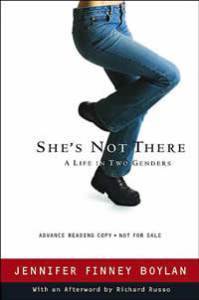 1. She’s not There: A Life in Two Genders – Jennifer Finney Boylan. My mom lent this to me, as it was the Freshman Read at my alma mater last year. It was a wonderful memoir of a MTF trans woman and her experiences. Funny and moving.
1. She’s not There: A Life in Two Genders – Jennifer Finney Boylan. My mom lent this to me, as it was the Freshman Read at my alma mater last year. It was a wonderful memoir of a MTF trans woman and her experiences. Funny and moving.
2. The Darkest Part of the Forest – Holly Black. Holly Black is one of my authors I go to for a comfort read.They always have characters you root for, a great atmosphere, and tight plots. This one is set in a small town of Fairfold where the fae are always nearby and have a way with meddling with lives.
3. The Martian – Andy Weir. I listened to this on audiobook. It was an interesting book, and how if I’m ever trapped on Mars, I’ll know how to grow potatoes.
4. In the Woods – Tana Franch. I loved this book. Excellently written and a great mystery. Detective Andrew Ryan is in some ways frustrating and unlikeable (though understandable considering the massive amount of stress he’s under in this book), but his partner Cassie Maddox is the real star of the show. Really want to read The Likeness now, as it stars her.
5. Waverley – Walter Scott. Re-read for an essay for uni, plus about a book’s worth of articles and excerpts of analysis. I’m writing about the supernatural and Gothic allusions in the book.
6. Loose Changeling – A.G. Stewart. Andrea��is in one of my writing groups and��she came to my Shadowplay launch in SF. I was excited to read her first book and it was fun, fast-paced urban fantasy with fae. A perfect palette cleanser after the rather dark In the Woods and the very dense prose of Waverley.
7. Second Position – Katherine Locke. If you love ballet films with Center Stage, do yourself a favour and read this book. It’s a romance about two ballet dancers whose lives have fallen apart. After four years, they run into each other again and wonder if they can ever hope to pick up the pieces.
8. Turning Pointe – Katherine Locke. Technically this is a novella, but I’ll count it anyway. It’s a prequel novella for Second Position and was just as lovely, and very sad as it’s set around the events that drove Zed and Aly apart four years before the book.
Total books in 2015: 25


April 5, 2015
Art, That’s Special
Happy Chocolate Egg day!
I watched Boyhood on the flight home from California. Many details overlapped with mine and (especially) my brother’s childhood. I liked this short clip so I’m putting it on my blog, about work ethic + natural talent.
Mr. Turlington: Who do you wanna be, Mason? What do you wanna do?
Mason: I wanna take pictures. Make art.
Mr. Turlington: Any dipshit can take pictures, Mason. Art, that’s special. What can you bring to it that nobody else can?
In other news, Shadowplay made the longlist of the Tiptree Award.��I love Tiptree’s work and always harboured a hope to be on that list because the Micah Grey series is all about exploring gender, so that was a nice boost to yesterday, when I was having a rough day. Congratulations to the winners and everyone on the list. :)

April 1, 2015
Books Read in March
I actually read more this month that I thought I had, since it’s been such an emotional roller coaster.
 1. The Girl on the Train – Paula Hawkins. A fast-paced thriller I read in a day, about a woman who sees something on a train and has to unpick the mystery. I do love me some unreliable narrators.
1. The Girl on the Train – Paula Hawkins. A fast-paced thriller I read in a day, about a woman who sees something on a train and has to unpick the mystery. I do love me some unreliable narrators.
2. No Place to Hide: Edward Snowden, the NSA, and the U.S. Surveillance State – Glenn Greenwald. Book research.
3. Inheritance (Adaption #2) - Malinda Lo. Been meaning to read the 2nd half of this dulogy for awhile and it did not disappoint. Loved learning more about the Imria and getting to the bottom of the mystery. Plus: polyamory in YA!
4. In Case of Emergency – Courtney Milano. Reading for the Bisexual Book Award. I enjoyed this one a lot.
5. Solaris Rising 3 – edited by Ian Whates. I finally got around to reading this anthology, which has my story “They Swim Through Sunset Seas” in it. A good collection–I really enjoyed Gareth Powell’s story in particular.
6. A Darker Shade of Magic - V.E. Schwab. Loved this book. It was the perfect escape during a particularly difficult week.
7. Greenvoe – George Mackay Brown. Read for uni.
Technically I also read Masquerade this month, but I’m never sure if I should count my own books in the totals. It does take me 2x as long to read them as I’m going over them more carefully. I also read some other articles and stories and such for uni.
Total this year: 18 books
Goal: 75 books

March 24, 2015
My Dad’s Eulogy
My dad went into the hospital in late February for pneumonia. He took a turn for the worse, as he had an existing lung disease and couldn’t fight it off, and I flew out to California on March 17th. He passed away March 19th and his memorial was March 22nd. I thought I would share the eulogy I wrote for him, even though it’s personal, because I want people to know what a weird and wonderful person he was.
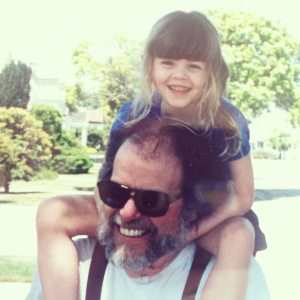 My dad and me in 1992.
My dad and me in 1992.
���I have tried in my way to be free.��� – Leonard Cohen
My dad would have wanted me to write a eulogy about him. So I will, though writing about him in the past tense still feels strange and wrong.
My dad was an odd man. And he���d be the first to agree. He had a colourful life and I can share a lot of stories of my dad���s rather interesting past. Others can share plenty more. He had pneumonia at 6 weeks old, so at the beginning and end of his life. Even as a kid was stubborn. He refused to eat anything except cherry turnovers and Coke, so my dad, in Canada in the 1950s, had rickets, and as an adult had a dip in his sternum.
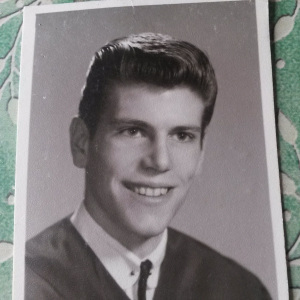 My dad’s high school portrait. Note skinny tie, which he was very proud of.
My dad’s high school portrait. Note skinny tie, which he was very proud of.After Canada, he moved to LA. As a teenager, my very white dad very nearly joined an LA Mexican gang which is still around today. He gave himself a gang tattoo on his left arm, which he eventually turned into an R for his last name. To stop him from joining the gang, his family moved to Sacramento, where my dad then promptly got into more trouble. He was the first person at his high school to be kicked out for marijuana. He fathered a child when he was sixteen, my sister Wendy (now 52). At one point, his grades were 2 As���in art and drafting���and Fs in everything else.
My dad became a full-fledged hippie, with 4 foot long hair and customized extra wide bell-bottom jeans. He lived in San Francisco, going to art school, and probably tried most drugs at least once. He smoked pot pretty much every day for four decades. At 20, he fathered another child, my older half-brother Jay (now 48). Because of his new status as a dad, he wasn���t drafted into the Vietnam War. He dated a woman he loved named Nancy. He met my mom in 1983, at her birthday party, which was his birthday as well. They were married in a rose garden. I was born five years later, and my little brother nearly four years after that. My parents divorced when I was 8, and it was a long-drawn out affair with harsh words on both sides. But, eventually, my parents became friends again.
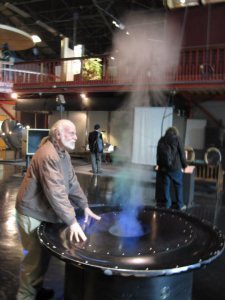 My dad looking a little like a mad scientist at the Exploratorium in SF in 2011.
My dad looking a little like a mad scientist at the Exploratorium in SF in 2011.My dad dabbled in a few potential careers, including doing special effects in Hollywood. He did this and that, always scheming, convinced that his big break was just around the corner, and that eventually he would be really rich. Unfortunately, none of these schemes ever worked out, and sometimes the family bore the cost. He couldn���t work for ���the man.���
No one could ever rely on my father financially. He could never afford to give his kids presents, and was always short on child support. Once, he borrowed my student loan money to make rent and paid me back in groceries bought with his food stamps. He was forgetful, and if you wanted him to be somewhere at a certain time, you had to tell him to get there 30 minutes earlier, since he was always late. He was messy–that’s a gross understatement–and lived in an industrial shop full of junk.
My dad could be incredibly annoying, and talked non-stop, usually about his schemes, or math, or politics. Companionable silence was not his forte. Even when he was first in the hospital and he couldn���t speak because of the ventilator, they still couldn���t shut him up, and he wrote reams of notes for his family to read. He���d put hearts in��his exclamation marks, like a 12-year-old girl. At the end, seeing him so quiet was one of the hardest things.
He always wanted to learn more, even if certain things didn���t come easily to him. He loved films, taking us to the movies all the time, especially to the super saver cinema where the tickets were $2. We saw The Matrix 13 times in the theatre there. He wanted to write a screenplay one day. He practiced his broken Spanish with people all the time. He taught himself advanced mathematics and programming and memorized Pi to 1000 places. He studied the stock market. All part of his many schemes and a constant desire to understand the world around him.
For a long time, I was angry with him, for not being able to support his family like my friends��� dads. I could be so surly towards him, especially as a teenager. When I moved to Scotland, I didn���t talk to him that much. If I phoned him, he spoke at me incessantly instead of having an actual conversation. But the last time I was out and found out he had interstitial lung disease, I told him I did want to have more contact with him, and he was so happy. He got much better at listening. We emailed back and forth, and now I have those forever.
 My dad giving a speech at my wedding.
My dad giving a speech at my wedding.I always knew my dad loved me and my siblings fiercely. I never had the tiniest doubt about that. He told us he loved us all the time. In one of his last emails to me he said ���I love you taller than the billionth Universe in the total web of existence!��� He was so proud of all our accomplishments. When Wendy reached out and found him when she was 37, he was delighted. He always wanted to find her but never had the money to hire a detective. He spoke to Jay on the phone all the time about politics and football. He read all my books and told me how proud he was of them. I���m so glad he read False Hearts, and I���m sad that he���ll never read Masquerade. He spent a lot of time with my brother Ian, and they never fought.
My dad was a strange man, full of contradictions. He was curious, he was hopeful, he was infuriating, he was selfish, he was wonderful and kind. My dad died flat broke but rich in love.
I will miss him so much. I love him taller than outer space and longer than time.
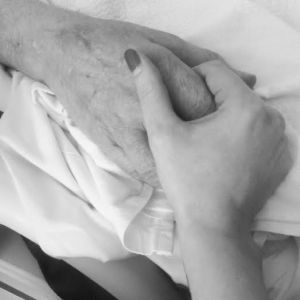 RIP Gary Lyle Richardson (19 December 1945 – 19 March 2015)
RIP Gary Lyle Richardson (19 December 1945 – 19 March 2015)

March 11, 2015
Ten Snaps: The Isle of Skye
Last week, I went to the Isle of Skye with Kim Curran and Amy Alward for a writing retreat. And, unexpectedly, the photographer JB Knibbs, due to a fortunate communication mishap. After getting over the surprise of someone already being at the house, and her expected solitude interrupted, we all got along brilliantly.
We wrote some words, we did some adventuring (rain or shine–mostly rain, except for the one day we tried to go for a walk and didn’t even make it to the gate due to horizontal rain-hail in the face). We ate scones and drank mulled cider. It was an excellent trip in a beautiful corner of the world.
And now the ten snaps:
 On the way to Skye
On the way to Skye Eilean Donan Castle
Eilean Donan Castle Bank of Scotland in Gaelic
Bank of Scotland in Gaelic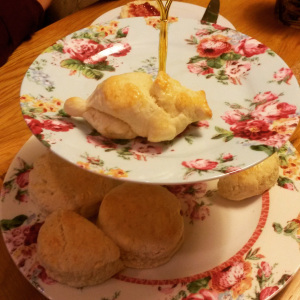 Scones! The top one is shaped like a cat
Scones! The top one is shaped like a cat The Quaraing in Skye
The Quaraing in Skye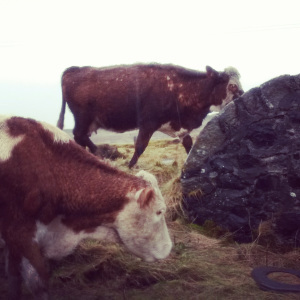 Cow crossing!
Cow crossing!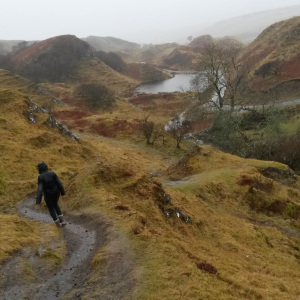 Amy Alward traipsing through the Fairy Glen
Amy Alward traipsing through the Fairy Glen The Fairy Glen
The Fairy Glen Mulled cider
Mulled cider The Fairy Pools
The Fairy PoolsFor more photos, follow me on Instagram. In addition to travel snaps, I also post photos of cats, food, bookish things, and things I see while walking about.

March 3, 2015
On That Article from that Former MFA Professor, from a Current MFA Student
I’m currently most of the way through my MLitt in Creative Writing. When that article from a former MFA professor circulated around, all I could think is: man, I feel really sorry for his former students. Also, I’m glad my professors aren’t like that, because otherwise I’d have quit.
There have been other responses. Chuck Wendig has a one, as does Foz Meadows.
The condescension drips from that article, and is basically a load of tosh. I’m an experienced writer (I guess?), so if I’d been in a class and heard a teacher��come out with these sorts of things, I’d know to ignore them. Maybe if I was brave enough, I’d call them out on it.
For a new writer, just finding their voice and figuring out what they want to write and gathering the confidence to do it, this could be very toxic.
If your main hope is that most of your students come out of the MFA to become better readers rather than better writers? That’s a problem. You should want all your students to improve their writing. Otherwise, what are you teaching them?
An MFA student is probably paying a lot to pursue the course. My MFA is ��3400, and that’s a lot cheaper than many places outside of Scotland. Then there’s the wages they’re losing by not-working or working part-time to devote the time to improving their craft. It’s a big investment. The least you can do is not write off most of them as doomed to be failures. Yes, not everyone who gets an MFA in creative writing goes on to become a published novelist, or poet, or screenwriter. They might not WANT to, and that’s fine, too. Not everyone��coming into��the course will necessarily have the same skill sets or experience. Some might not want to write the type of literature that the teacher adores. I don’t need to pay that much money for someone to look down on me.��That doesn’t mean I expect my teachers to say all my writing is brilliant. I expect them to teach me new approaches, skills, and ways of looking at my craft.
I have done a bit of creative writing teaching, mostly for teenagers at school visits, but I’ve taught most age groups now. I would never, ever tell these students they’re awful. I would point out ways to improve, say it needs more work or a different approach. I would never tear a student down. If someone had done that to me at 16, maybe I wouldn’t have books out now.
Perhaps the reason he can dismiss his students so easily is because he thinks writers are born with talent. No. No no no. Sure, some people might be more predisposed to writing than others. Some might find it easier. Some might enjoy it more. Some might be able to write a publishable novel on the first go, and some might take a few practice novels first. But no one springs from the womb ready to write a perfect novel without doing any sort of work at their craft.
I’ve re-read the aborted novel I started when I was 16. Certain bits of it were actually okay. Most of it was unfocused. There were some nice turns of phrases, and a lot of clunky ones. I had no idea what I was doing with the plot. I had fairies and cat people, and no clear reason as to why or how they fit into the world, which was sketchily built at best. My characters weren’t particularly engaging. The first line, for crying out loud, was “the sunset was as red as blood.” Pretty cliche. Years went by. I read a lot. I wrote a lot. I got better.
If you put your hands up and say “well you either have it or you don’t” then you’re giving up on teaching them anything and you’re not taking responsibility��for trying to.
If you didn’t decide to take writing seriously by the time you were a teenager, you’re probably not going to make it.
Really? Have you met teenagers? Do you remember being a teenager? Not a lot of us knew what we were doing. I certainly didn’t. I was just at a school visit last week and overheard a teen insisting earnestly to another boy that a condom could be used twice. As a teen, you’re learning about so many areas of your life and growing into the person who knows who they want to be and what they want to do.
As a teenager I knew I wanted to be a writer, but��I saw it as a very far off goal. I was also thinking about other paths. I was pretty serious about drawing as a teenager, and not bad at it. If I’d focused my attention on art rather than writing, I might be doing that now. Maybe not.
And how many people are there who have sold their debuts in their 50s or older? Plenty. Does that mean they’ve “made it”? That’s such a vague phrase anyway–what does it even mean? For some, making it is finishing something. For others, it’s self-publishing a book to give to friends and family. Maybe they want to publish some short stories in magazines. To others, it’s selling a book to a traditional publisher for a small sum. Still others will only think they’ve made it when they made a million dollars and had a film deal. And even then they might not feel they’ve “made it.” The goalposts always change. It’s a meaningless phrase.
If you complain about not having time to write, please do us both a favor and drop out.
That I agree with, shockingly. Yes, you should write while doing your MFA, and devote the time to it. But his response is written with blanket statements. You do not know the circumstances of all your students or what they go through. Last week my dad was in hospital. I wasn’t able to write or finish my uni reading over the weekend. Not all of your students will be able to stop working entirely. For most of last semester, I was working 30 hours a week. Most students aren’t there to piss around. They also have busy lives that can sometimes get in the way. ��Sometimes they might be afraid to write, and use time as an excuse.
Also, really, saying if someone asks if they’re a “real writer” they’re obviously not? I’ve written five books and I STILL ask myself if I’m a “real writer.” Every writer suffers from impostor syndrome. A lot of us are bundles of nerves. If you say your students are��not “real” writers for having doubts, then you’re a shitty teacher.
If you aren’t a serious reader, don’t expect anyone to read what you write.
Again, yes, you should read a lot if you want to write. It’s the best way to learn. But then he goes on to shame people’s reaching habits, saying you’re a Real Deal if you devour Great Literature as Judged by Him. I tried to read 2666. I like Roberto Bola��o’s shorter work, but the large tome was not for me. Reading The Book of the New Sun by Gene Wolfe is just as challenging, if that’s your goal, but for me it was more rewarding. A lot of creative writing programs aren’t that keen on genres, being mildly tolerant to downright sneery of sci fi, fantasy, and crime. Those are all healthy areas of the bookstore. Those are all ways someone can make a living off their writing, and if they’re writing what they enjoy reading, it’ll show.
No matter what you want to write, reading across a bunch of genres will do you more favours than just reading��one type of book. ��Don’t shame people for reading books they enjoy. They’ll learn from whatever they read, and then maybe they’ll move onto other kinds of books. I’ll read “trashy” books sometimes. I don’t call them guilty pleasures anymore. I’ve nothing to be guilty about.
No one cares about your problems if you’re a shitty writer.
This whole response is really dismissive of child abuse and trauma. Foz Meadow’s response focuses really well on that. He really, actually said that some of his student’s writing makes them wish they’d suffered more abuse as a child. What in the world? That is an awful thing to say. Imagine someone who wrote about a very personal aspect of their life, and they see their professor wrote this load of tripe.
Even stepping aside from that bombshell–sometimes people write about things from their past, whether intentionally or unintentionally. I did it, early in my writing. I was writing what I knew. It was a good starting point. It was even therapeutic. Were the pieces incredible and moved everyone who read them to tears? No. And I was still learning my craft, so my prose was clunkier. Now my work has made people cry and laugh. But if someone had dismissed my early attempts, it would have set me back.
You don’t need my help to get published.
I really wish creative writing programs focused more on the business aspect of writing. It’s important to understand the business, how money and payment works, what you might expect from a first novel advance. Taxes!��The admin side of writing takes up a lot of time (I just spent the morning wrangling my expenses. So exciting). An MFA isn’t a requirement to be published, obviously. But you’d hope by doing one you’d learn some skills that might give you an edge.
But even outside of the nitty gritty aspects, a professor should, ideally, understand the current publishing industry and be able to offer advice to students, should they ask. If a teacher doesn’t feel they know that much about the current state of the industry…maybe learn about it? It’s not that difficult, and it’s part of the job. It’s a huge task, trying to find a home for a piece of writing, and can be so overwhelming to someone just starting out.
Quote: “I��find questions about working with agents and editors increasingly old-fashioned. Anyone who claims to have useful information about the publishing industry is lying to you, because nobody knows what the hell is happening. My advice is for writers to reject the old models and take over the production of their own and each other’s work as much as possible.”
You’re advising all your students to self-publish? Eh? Plenty of people still want to go the traditional publishing route, and if so, you should know enough about it to at least point them to some resources. Pretty sure my agent and editors know plenty about the industry they work in, thank you very much. Self-publishing is another valid route to take, but they should know what both paths are like and what they can expect and if it’s right for them.
It’s not important that people think you’re smart.
Yeah, I agree with that. You don’t need to bash someone over the head and go “I’m clever! I’m clever!” with your writing. It can be wearying. A lot of early writers might try that, and a teacher��can show them other options or challenge them to try something else.��I agree with this, that you don’t need to show an ego to write, and that entertaining writing is a good goal to work towards. “The funny thing is, if you can put your ego on the back burner and focus on giving someone a wonderful reading experience, that’s the cleverest writing.”��I agree with this.
It’s important to woodshed.
And then I disagree with this again. “I spent seven years writing work that no one has ever read.” Those 7 years would probably have been more fruitful if he’d shared his work with beta readers. I personally wouldn’t have wanted to delay my writing career by 7 years for…whatever reason. “That’s why I advise anyone serious about writing books to spend at least a few years keeping it secret.” Noooooo. Fine if you want to, but this makes it seem like writing is something to be ashamed of or that no one else can help you with it (even though they just spent a bunch of money hopefully getting help on their writing through an MFA). I enjoy sharing my writing with others. It’s why I write books in the first place. And I’m grateful for the people who read my earlier, uglier drafts. My friend Erica once told me, gently, that I should probably scrap this beginning of a draft of a novel and try a different approach. She was 100% right and I knew it, but hearing it from her helped give me the courage to do that, rather than spending a lot more time on a book that wasn’t working. How can you know if you’re writing something that entertains others if you never show it to them?
Nothing gets under my skin more than someone saying “THIS is definitively the right way to write.” Because for a lot of people, it really won’t be. People want to write different types of things. Just yesterday in class, our teacher asked us what our goals are. Some want to write novels, some poetry, some short stories. One person was interested in getting into screenwriting or documentaries. One writes but her main goal is to become an editor. She’s German, so she came here to develop her writing but also to improve her English so it’s easier to get a job when she’s back home, as many German publishing companies translate works originally in English. Another wants to get into teaching and translating. Some aren’t really sure what they want to focus on yet, but are interested in discovering that through writing more. Every one of my fellow students are worthwhile. None of them should be talked down to or dismissed. We’re all “Real Deals.” We’re there, wanting to learn.



